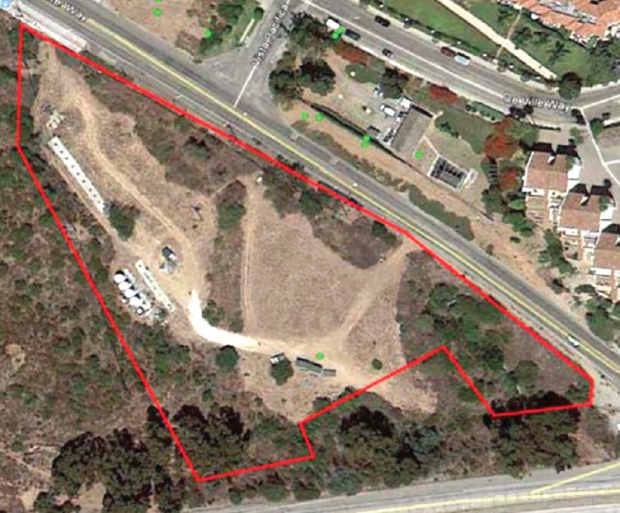
City officials last week estimated that building a centralized wastewater treatment facility to rid Civic Center businesses of septic systems would cost the city $41.7 million, lending hard numbers for the first time to what before had been only wide-ranging projections.
The city hopes to fully fund the facility through payments from Civic Center commercial and residential landowners to an assessment district. A tentative site has been identified for the facility on a parcel along Civic Center Way in Winter Canyon opposite the Maison De Ville condominiums.
City Manager Jim Thorsen revealed the $41.7 million cost estimate during a public scoping meeting on Wednesday last week at City Hall, where the public was asked to weigh in on the project ahead of an environmental impact report (EIR).
“This includes design, EIR, permits, land purchase, collection system, recycled water distribution, injection system and construction management,” Thorsen wrote in an email Tuesday.
Previous estimates had ranged from between $30 million and $50 million.
During the meeting, locals voiced a number of questions they believe the EIR must address. Questions ranged from mechanisms being used to dispose and/ or recycle wastewater, how a massive power outage could affect the system and construction of the sewer system on a parcel known to be located above an active earthquake fault.
Under a development prohibition placed on the City of Malibu in 2011 by the Los Angeles Regional Water Quality Control Board, the city is required to build a centralized wastewater treatment system in the Civic Center by November 2015. However, Thorsen said the city is nine months behind on that timeline.
The agreement also stipulates homeowners living within the Civic Center prohibition area must connect to the system by 2019 and phase out their septic systems.
The state argues that the Civic Center needs a centralized system because wastewater from the area is trickling down and polluting nearby ocean water. After passing through the facility, the treated wastewater will qualify as Title 22 effluent. That standard of treated wastewater falls short of drinking water standards but is largely harmless to the environment.
“It’s water that’s deemed by the State of California to be used for nonpotable uses. You can use it to irrigate plants, irrigate ballfields. You can do anything but drink it,” said Leslie Dumas, a senior water resources engineer with engineering firm RMC Water and Environment. The city has retained RMC to design the treatment facility.
Plant to be built in Winter Canyon
The treatment plant is tentatively rendered for construction in Winter Canyon on a triangular piece of land enclosed by Civic Center Way to the north, Pacific Coast Highway to the south and the Rancho Malibu Hotel Development to the west.
The site comprises two parcels, one owned by the Malibu Bay Company and the other belonging to an LLC registered under the name MBC Colony Plaza, according to Senior Planner Bonnie Blue.
Thorsen said the city had considered two other areas but ultimately found the Winter Canyon site the best fit.
“The site was picked because we have a willing seller letter from the property owner,” Thorsen said.
Other sites considered were the Wave property and the La Paz development site. Both are located east of the Malibu Library.
System designed to redistribute treated water
Plans call for 13.7 miles of new piping throughout the Civic Center to collect and redistribute treated water. But some are worried there will be an abundance of treated water with no place to send it.
“I want to know how much water is being injected into the ground versus how much water is being recycled, reused and redirected,” resident Wendi Werner said last week.
Dumas said the city is working on as many reuse options as possible, but much of the leftover water could end up underground.
“Anything that can’t be used for irrigation is going to be injected into groundwater bases or pumped into seepage pits,” said Dumas.
To read more on the project, visit malibucity.org. The city is soliciting questions and comments from the public until Jan. 7, 2014. Letters should be addressed to Blue at Malibu City Hall or emailed to bblue@malibucity.org.
